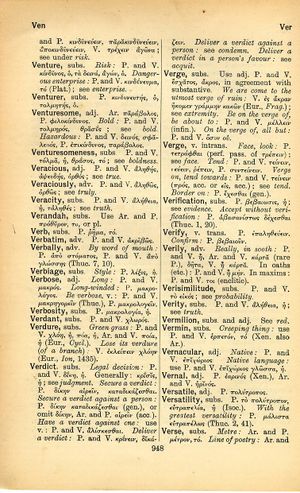verge: Difference between revisions
From LSJ
οἷς πρόθεσίς ἐστιν ἀδικεῖν, παρ' αὐτοῖς οὐδὲ δικαία ἀπολογία ἰσχύει → not even a just excuse means anything to those bent on injustice | the tyrant will always find a pretext for his tyranny | any excuse will serve a tyrant
m (Text replacement - "<b class="b2">Frag.</b>" to "''Frag.''") |
m (Woodhouse1 replacement) |
||
| Line 1: | Line 1: | ||
{{Woodhouse1 | {{Woodhouse1 | ||
|Text=[[File:woodhouse_948.jpg|thumb|link={{filepath:woodhouse_948.jpg}}]] | |Text=[[File:woodhouse_948.jpg|thumb|link={{filepath:woodhouse_948.jpg}}]] | ||
===substantive=== | |||
Use adj. P. and V. [[ἔσχατος]], [[ἄκρος]], in agreement with substantive. | Use adj. [[prose|P.]] and [[verse|V.]] [[ἔσχατος]], [[ἄκρος]], in agreement with substantive. | ||
[[we are come to the utmost verge of ruin]]: [[verse|V.]] [[ἐς ἄκραν ἥκομεν γράμμην κακῶν]] ([[Euripides|Eur.]], ''Fragment''); see [[extremity]]. | |||
[[be on the verge of be about to]]: [[prose|P.]] and [[verse|V.]] [[μέλλειν]] (infin.). | |||
[[on the verge of]], [[all but]]: [[prose|P.]] and [[verse|V.]] [[ὅσον]] οὐ. | |||
===verb intransitive=== | |||
[[face]], [[look]]: [[prose|P.]] [[τετράφθαι]] (perf. pass. of [[τρέπειν]]); see [[face]]. | |||
[[tend]]: [[prose|P.]] and [[verse|V.]] [[τείνειν]], [[νεύειν]], [[ῥέπειν]], [[prose|P.]] [[συντείνειν]]. | |||
[[verge on]], [[tend towards]]: [[prose|P.]] and [[verse|V.]] [[τείνειν]] ([[πρός]], acc. or [[εἰς]], acc.); see [[tend]]. | |||
[[border on]]: [[prose|P.]] [[ἔχεσθαι]] (gen.). | |||
}} | }} | ||
Revision as of 08:51, 20 May 2020
English > Greek (Woodhouse)
substantive
Use adj. P. and V. ἔσχατος, ἄκρος, in agreement with substantive.
we are come to the utmost verge of ruin: V. ἐς ἄκραν ἥκομεν γράμμην κακῶν (Eur., Fragment); see extremity.
be on the verge of be about to: P. and V. μέλλειν (infin.).
on the verge of, all but: P. and V. ὅσον οὐ.
verb intransitive
face, look: P. τετράφθαι (perf. pass. of τρέπειν); see face.
tend: P. and V. τείνειν, νεύειν, ῥέπειν, P. συντείνειν.
verge on, tend towards: P. and V. τείνειν (πρός, acc. or εἰς, acc.); see tend.

